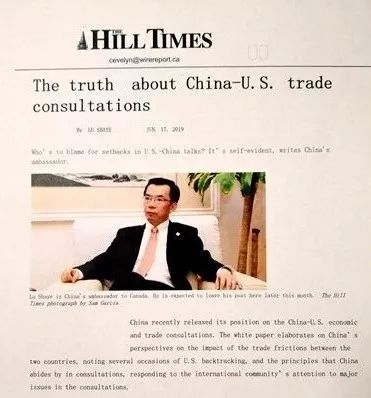中国驻加拿大大使卢沙野在加《国会山时报》发表署名文章《中美贸易磋商的真相是什么》
6月17日,卢沙野大使在加拿大《国会山时报》发表题为《中美贸易磋商的真相是什么》的署名文章,全文如下:
近日,中方发布了《关于中美经贸磋商的中方立场》白皮书。白皮书从中美经贸摩擦的影响、美方在磋商过程中几次出尔反尔、中方对待磋商的原则立场等角度,回顾了中美经贸磋商的基本情况,阐明了中方对于中美经贸磋商的政策立场,回应了国际社会对中美经贸磋商关注的主要问题。
一、现任美国政府到底想干什么?
现任美国政府奉行“美国优先”政策,对外采取一系列单边主义和保护主义措施,动辄使用关税“大棒”,将自身利益诉求强加于他国。美国无视中美经济结构、发展阶段特点和国际产业分工现实,坚持认为中国采取不公平、不对等的贸易政策,导致美国出现对华贸易逆差,在双边经贸交往中“吃了亏”,并对华采取单边加征关税措施。国际社会中的许多国家应对美的单边贸易霸凌行为有共同感受。美利用其国内法,对欧盟、日本、加拿大、墨西哥等采取加征关税的措施,近日又宣布取消印度最惠国待遇,逆经济全球化大势,肆意挑起全球贸易争端。
二、谁在中美经贸磋商中出尔反尔?
美方自挑起中美经贸摩擦后,双方磋商经历几次波折,均由于美方的出尔反尔。美三次推翻已达成共识的内容,对于磋商过程中中方提出文本内容及相关表述的修改意见的通常做法,美方却指责中方在磋商中“开倒车”,坚持不合理的高要价,坚持在协议中写入涉及中国主权事务的要求,坚持不取消加征的全部关税,并且以提高加征关税的税率来施压,致使谈判严重受挫。孰是孰非,不证自明。
三、美方挑起全球贸易摩擦伤害了谁?
美加征关税导致两国贸易和投资下滑,提高了企业成本、抬升了国内物价、阻碍了出口,损人不利己。贸易战没有实现美国经济增长,反而将导致美GDP增幅在未来几年每年减少0.3% – 0.5%。美方采取的贸易保护措施,违反世界贸易组织规则,损害多边贸易体制,威胁全球经济增长,严重干扰全球产业链和供应链,给全球经济复苏带来严峻挑战。
四、中方经贸磋商的立场是什么?
经济全球化和贸易自由化是不可阻挡的时代潮流,以邻为壑的单边主义、保护主义不得人心。中国始终坚持平等、互利、诚信的磋商立场。中美应秉持相互尊重、平等互利的精神,本着善意和诚信,通过磋商解决问题,缩小分歧,扩大共同利益,共同维护全球经济稳定和发展。在原则问题上,中国决不让步,任何挑战都挡不住中国前进的步伐。
中美达成一个互利双赢的协议,符合中美两国利益,顺应世界各国期待。希望美国同中国相向而行,本着相互尊重、平等互利的精神,管控经贸分歧,加强经贸合作,共同推进以协调、合作、稳定为基调的中美关系,增进两国和世界人民福祉。
The truth about China-U.S. trade consultations
On June 17, The Hill Times published a signed article by Ambassador Lu Shaye titled “The truth about China-U.S. trade consultations”. Here is the full text:
China recently released its position on the China-U.S. economic and trade consultations. The white paper elaborates on China’s perspectives on the impact of the trade frictions between the two countries, noting several occasions of U.S. backtracking, and the principles that China abides by in consultations, responding to the international community’s attention to major issues in the consultations.
What does the U.S. government intend to do?
Trumpeting “America First,” the current U.S. administration has adopted a series of unilateral and protectionist measures, regularly wielded tariffs as a “big stick,” and coerced other countries into accepting its demands. Turning a blind eye to the difference of the nature of the economic structure and the stage of development in China and the U.S., as well as the reality of the international industrial division of labour, the U.S. insists that China’s “unfair” and “non-reciprocal” trade policies have created a trade deficit in bilateral commercial exchanges where the U.S. was “being taken advantage of,” leading to unilateral imposition of additional tariffs on China.
Many other countries in the international community would share the same feeling of the U.S.’s unilateral trade bullying. The U.S. slapped tariffs on the European Union, Japan, Canada, and Mexico by invoking its local laws, and cancelled the most favoured nation treatment for India recently. It acted against the trend of economic globalization and arbitrarily provoked international trade disputes.
Who backtracked in China-U.S. consultations?
Since the U.S. provoked trade frictions, there have been several setbacks in the consultations, each of them being the result of U.S. backtracking. The U.S. has torn up consensus three times. However, as China made new proposals for adjustments to the text and language in ongoing consultations, which is a common practice, the U.S. accused China of “backtracking.” It persisted with exorbitant demands, insisted on including mandatory requirements concerning China’s sovereign affairs in the deal, and maintaining the additional tariffs imposed, and put pressure by raising tariff rates. These led to the serious setback in consultations. Who’s to blame? It’s self-evident.
Who was hurt in the U.S.-provoked trade frictions?
The U.S.-imposed tariffs led to the slide of bilateral trade and investment, raised costs for businesses, added to domestic commodity prices, and impeded exports, harming others without benefiting itself. The trade war did not boost the U.S. economy. On the contrary, it will reduce the U.S.’s annual GDP growth by 0.3-0.5 percentage points for several years. The trade protectionist measures taken by the U.S. go against the WTO rules, damage the multilateral trading system, seriously disrupt global industrial chains and supply chains, and pose a serious challenge to global economic recovery.
What’s China’s position on the consultations?
Economic globalization and trade liberalization are firmly-established trends of the times. Beggar-thy-neighbour unilateralism and protectionism are unpopular.
China is committed to credible consultations based on equality and mutual benefit. Guided by a spirit of mutual respect, equality and mutual benefit, the two countries should push forward consultations based on good faith and credibility in a bid to address issues, narrow differences, expand common interests, and jointly safeguard global economic stability and development. In issues of principle, China will not compromise. No challenge will hold back China’s development.
Striking a mutually-beneficial and win-win agreement serves the interests of China and the U.S., and meets the expectations of the world. It is hoped that the U.S. can pull in the same direction with China and, in a spirit of mutual respect, equality, and mutual benefit, manage economic and trade differences, strengthen trade and economic cooperation, and jointly advance China-U.S. relations based on coordination, cooperation, and stability for the well-being of both nations and the world.
轻松加拿大网站文章连续朗读功能:所见既所闻--可以在通勤(开车、公交)、做家务(做饭、清洁)、锻炼身体等场景下,连续收听多篇相关文章(如社区新闻、加国新闻、北美新闻、政策更新、深度新闻报道)。无需中断当前活动去手动切换文章,最大化利用碎片时间,高效获取信息,真正实现“一心多用”。



-2.jpg)